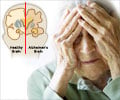
‘Timely guidance on the design and management of clinical research during COVID-19, specifically on the conduct of lifestyle-based risk reduction studies in people at risk for cognitive decline and dementia helps to better understand the pandemic impact on the study. Also, the appropriate measures taken to gain a longitudinal perspective of the pandemic impact by conducting several clinical trials enable us to evaluate the effectiveness of the responses to the pandemic across different cultures, local environments, and phases of the pandemic that would help in designing better interventions.’
Tweet it Now
Alzheimer's disease (AD) is a neurodegenerative disease that leads to gradual memory loss and behavioral changes. It is characterized by the formation of beta-amyloid plaques and the tau proteins in the brain tissues, 7-15 years before the actual symptoms occur. Three trials of the COVID-19-related experiences, each at a different stage of the study process is described in the study (with a response to COVID-19, the WW-FINGERS network created a shared space for its members), that includes the following
- J-MINT: Japan-multimodal intervention trial for prevention of dementia -- mainly in the recruitment process (~December, 2020) and intervention delivery.
- U.S. POINTER: U.S. study to protect brain health through a lifestyle intervention to reduce risk -- recruitment process and intervention delivery.
- German AgeWell.de study – intervention adherence and post-intervention follow-up.
"The COVID-19 pandemic has profoundly altered the landscape for the design and conduct of clinical trials of multidomain lifestyle interventions. This is especially true in studies focused on cognition, Alzheimer's, and other dementia, where the study population has some of the greatest health risks". "With this collaborative publication, we bring together and discuss our experiences of the challenges we've faced, and continue to face, and how we've responded to them. By sharing our collective knowledge about the lessons learned so far, we can provide real-world, evidence-based recommendations to similar on-going and prospective lifestyle intervention trials," says Röhr, who also is an Atlantic Fellow for Equity in Brain Health at the Global Brain Health Institute.
The international teams with expertise gather, almost in real-time, the challenges that cut across the research and allow studies at earlier stages to adjust to these potential challenges, while more advanced studies will still be able to access expertise to adapt to their specific circumstances.
Advertisement
Effect of COVID-19 on Clinical Research
Advertisement
During a J-MINT study in COVID-19 pandemic, a wide pause from March to July 2020, U.S. POINTER researchers occurred. But the team maintained contact with study participants through phone calls that encouraged participants to continue to meet their study intervention goals. Intervention delivery shifted from in-person meetings to video conferencing.
Some data were accumulated continuously during the pause, but others were postponed and rescheduled. Following the pause, intervention meetings were held remotely and full adherence monitoring was resumed.
A similar effect was seen in AgeWell.de's intervention period. As the quarantine measures put restrictions on lifestyles, concerns specifically arose regarding social and physical activity and mental wellbeing.
Moreover, face-to-face post-intervention assessments were at risk; and changing the assessment mode would violate the data integrity. Thus, a safety and hygiene protocol was developed, including an option to be interviewed at the study site instead of at home.
To better understand the pandemic impact, the researchers mailed a survey to participants during the first lockdown to measure changes to everyday life, social and mental health, and resilience. The survey will be repeated to gain a longitudinal perspective of the pandemic impact.
"Conducting a clinical trial such as J-MINT is a huge challenge during the pandemic, but we have learned a lot about how to prevent the infection. Applying this knowledge to this and other clinical trials should be useful for improving future implementation of lifestyle-based dementia prevention measures," says Hidenori Arai, M.D., Ph.D., President, National Center for Geriatrics and Gerontology, and co-author of the newly published article.
Source-Medindia














